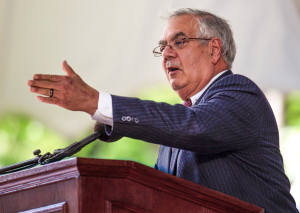“What might seem the most innocuous music is often the most avant-garde,” writes Ted Gordon on Gunther Schuller’s 1962 oeuvre “Journey into Jazz,” which Chamber Orchestra First Editions (COFE) will perform on Oct. 6 at Lang Concert Hall. Former Congressman and longtime LGBT rights advocate Barney Frank will narrate the piece, a story reminiscent of Peter and the Wolf with an experimental twist: third-stream jazz, or a blend of classical and jazz music. Additionally, NYC-based drummer and composer Gabriel Globus-Hoenich will add a brand-new piece to the COFE program, “Shattered Stones,” which will accompany two of Mozart’s early works, the Piano Concerto No. 21 and Symphony No. 29.
Mozart composed Symphony No. 29 at only 18 years old, while still living in Salzburg, Austria. According to Daniel Underhill Professor Emeritus of Music James Freeman, founder and Musical Director of COFE, Mozart may have paired the intimate feel of the piece with a striking finale in order to convince his father and even himself that he was talented enough to continue his career in Vienna.“It’s unlike any symphony that he had written up until this time,” Freeman said. “To see him suddenly produce a piece like the symphony that we’ll see at the end of the concert is sort of amazing. It just comes out of the blue.”
Both Piano Concerto No. 21, K. 414 and Symphony No. 29 were written in A major, a key that imparts on them a “lyrical, singing quality,” according to Professor Andrew Hauze, who will be featured as soloist on the Concerto. Mozart composed the Concerto just after he had arrived in Vienna at last, eight years after he wrote Symphony No. 29.
But what’s Congressman Barney Frank doing at a Mozart performance? After deciding to feature “Journey into Jazz,” Freeman asked himself, “Who would be an interesting narrator for this piece, a person who would perhaps—I hope—bring a different kind of audience to our concerts, a different kind of audience than has ever come before?”
Frank will also participate alongside Freeman and Hauze in a pre-show discussion at 7:30 P.M. before the 8 P.M. concert. Rehearsals for the show will be open to members of the Swarthmore community.
“I would say all of these pieces [in the COFE program] share a kind of vibrancy and energy, and to have Congressman Frank involved… for one thing, I never imagined that I would be the soloist on a program where he’s also the soloist,” Hauze said.
Freeman feels that this season’s COFE program will provide something to intrigue everyone, from connoisseurs of classical to jazz junkies to all Swarthmore students and staff.
“I just want people to experience recent classical new music, because I think people tend to be a little afraid of it as being too hard for them to understand, but’s it not,” Freeman said. “I hope they’ll hear the Mozart pieces and say, ‘Wow! I didn’t know Mozart was that interesting,’ because I think every note that guy wrote was interesting.”
Bayliss Wagner ’21
